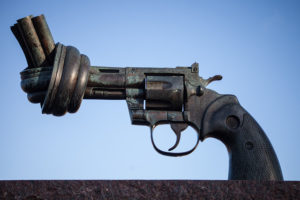
The Knotted Gun
The shootings by Stephen Paddock in Las Vegas on Sunday night were the deadliest in modern U.S. history. 59 people are now dead, with over 500 injured. And yet, on Monday, Trump White House spokesperson Sarah Huckabee Sanders, asked if Donald Trump was now discussing whether new gun laws are needed, replied that “it would be premature for us to discuss policy” so soon after the killings. Sanders’ reply is similar to what many conservatives and the National Rifle Association say when confronted with mass shootings of civilians involving semiautomatic or, in this case, automatic, weapons. They are wrong for a couple of major reasons:
First, Las Vegas is only the latest in a long line of mass shootings dating back decades in the U.S. This list includes, among others:
Columbine High School, CO — 1999.
Virginia Tech, VA — 2007.
Fort Hood, TX — 2009.
Aurora, CO — 2012.
Sandy Hook, NJ — 2012.
Washington, DC — 2013.
San Bernardino, CA — 2015.
Charleston, SC — 2015.
Roseburg, OR — 2015.
Orlando, FL — 2016.
The number of such mass killings (defined by the FBI as resulting in four or more dead victims) by shooting, and the associated number of deaths, has increased dramatically since Republicans allowed the federal semiautomatic Assault Weapons Ban to expire in 2004. Thus, it is not too soon to discuss how to curb gun violence that has been happening for many years. Moreover, a mass shooting occurs approximately every day in the United States. Accordingly, if Americans can’t talk about gun violence shortly after such events occur, we would never be able to talk about gun violence.
Second, the standard of not being able to discuss steps to curb gun violence after a deadly shooting seems strangely unique. For example, when a young black man is killed at the hands of police or an off-balance civilian, conservatives rush to find irrelevant but damaging information about the victim, because it creates negative impressions about him. Additionally, if there’s a plane crash, sometimes that model plane is grounded or required to undergo emergency inspections right away. And after the 9/11 attacks, policy discussions ensued immediately, and the United States went to war just days later.
Here, there are policy matters that Americans need to discuss regarding gun violence, and we are already very late in having the discussion. We can start with the low-hanging fruit on which most people agree. For instance, over 90% of Americans support universal background checks for all gun purchases. This includes private online sales, as well as gun shows. Likewise, those on the terrorist “No Fly” list should not be able to purchase firearms. Shockingly, last February, Donald Trump permitted severely mentally ill people to purchase guns. That decision should be reversed immediately. Additionally, the Assault Weapons Ban should be reinstated, including a ban on high-capacity ammunition clips. Incidentally, none of these changes would run afoul of the Second Amendment. As conservative Justice Antonin Scalia wrote in his majority opinion in the D.C. v. Heller case recognizing an individual right to bear arms:
Like most rights, the right secured by the Second Amendment is not unlimited…. For example, the majority of the 19th-century courts to consider the question held that prohibitions on carrying concealed weapons were lawful under the Second Amendment or state analogues. Although we do not undertake an exhaustive historical analysis today of the full scope of the Second Amendment, nothing in our opinion should be taken to cast doubt on longstanding prohibitions on the possession of firearms by felons and the mentally ill, or laws forbidding the carrying of firearms in sensitive places such as schools and government buildings, or laws imposing conditions and qualifications on the commercial sale of arms.
Moreover, we need to examine state laws as well as federal laws. In Nevada, for example, gun laws are shockingly lax. Gun purchasers don’t need any kind of permit, license or registration; it is legal to own assault weapons and large-capacity magazines; and there is no waiting period before taking possession of the newly purchased weapon.
Of course, no steps could eliminate all gun violence in the United States. Someone with a clean record could, for instance, legally purchase his first weapon, then become unhinged and turn it on innocent civilians. Nevertheless, when it comes to crucial life-and-death issues like gun violence, it’s never “too soon” to have a policy discussion which hopefully leads to steps that make us safer.
Photo by Håkan Dahlström, used under Creative Commons license. https://is.gd/LkMtMR


